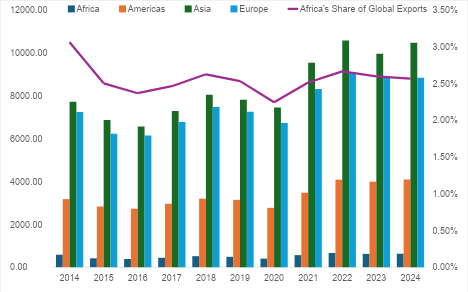Policy Brief
Thematic Area: Trade, Investment and Resilient Supply Chains

Trade & Investment: B20 South Africa 2025 Paper
Introduction
International trade drives economic development by enabling the exchange of goods and services, encouraging local production of previously imported items, generating employment, and fostering a vibrant business environment. This progress is strengthened by open markets, free trade, globalization, and a well-functioning, WTO rules-based multilateral trading system.
Though international trade promotes innovation and economic growth, it is presently characterized by rising trade protectionism, and lack of multilateral rules on issues including green trade and investment, digital commerce, among others. Further, the non-functionality of dispute settlement mechanism led to rise in unilateral trade measures, making multilateral trading unpredictable and less effective. In this context, the B20 South Africa 2025 proposed three policy priorities to support and preserve international trade while also promoting inclusive growth and sustainable development.
Figure 1: B20 South Africa 2025, Trade and Investment Recommendations

Source: B20 South Africa 2025, Trade and Investment Paper
The above recommendations are enumerated below.
Recommendation 1: Promote stability in global trade and improved market access through de-escalation of recent trade actions and pragmatic reform and sustained multilateralism
In the current geopolitical climate, global trade is grappling with significant challenges, as the tariff hikes in 2025 have fueled uncertainty and eroded the credibility associated with WTO membership. Retaliation by the trading partners of tariff-imposing countries has further heightened this uncertainty. Studies suggest that these trends could lead to a 0.2% decline in global goods trade, equivalent to around USD 50 billion, while broader unilateral policy actions might result in a more severe contraction of up to 1.5%, or approximately USD 366 billion.1.
Given this backdrop, B20 South Africa 2025 recommends the following policy actions to promote stability in global trade through reversal or de-escalation of recent trade measures.
Action 1.1: De-Escalate Tariff Crisis and Roll Back Tariffs, Minimize Non-Tariff Barriers and Recommit to Multilateral Principles
B20 South Africa 2025 recommends de-escalation and roll back of tariffs while also minimizing non-tariff barriers by recommitting to multilateral principles. The tariff crisis can be de-escalated by removing all extraordinary tariffs imposed since the last G20 Leaders’ Summit and implementing a G20-wide moratorium on new broad-based tariffs. Further, reaffirm commitment to the Most Favored Nation (MFN) principle across G20 nations.
Efforts should also focus on facilitating the reduction of both tariff and non-tariff barriers, particularly lowering tariffs on critical sectors such as agriculture, technology, and green energy, while addressing challenges faced by low and middle-income countries. Strengthening WTO working groups to resolve conflicting trade agreements can alleviate burdens on businesses, especially micro, small, and medium enterprises (MSMEs) and LMICs. Moreover, reducing illegitimate non-tariff barriers and harmonizing regulations across G20 states will promote smoother trade and investment flows.
Action 1.2: Reduce Erosion of the Multilateral Trading System in the Short-Term, While Pushing for Urgent Longer Lasting Reform of the WTO
Interim transitional measures can be implemented to maintain a predictable and stable rule-based trading system, ensuring continuity while protecting and advancing ongoing efforts for comprehensive multilateral reform. At the same time, negotiations at the WTO need to be revitalized to reinforce the foundations of the multilateral rules-based system. This includes pursuing long-term reforms and building consensus on new rules that address both longstanding controversial issues and emerging challenges in global trade.
Policy Action 1.3: Enhance Business Engagement Model with WTO to Build Relevant Trade Policy
Sector-specific international business working groups can be established to engage consistently with WTO committees, offering practical recommendations and implementation strategies, especially on complex or high-priority trade issues to help keep the WTO and global trade policy aligned with real-world business needs. Activate a formal B20 Advisory Council to provide structured and continuous input from the global business community into WTO processes and decision-making. Holding the council’s inaugural meeting on the sidelines of the 14th WTO Ministerial Conference (MC14) in Cameroon will be instrumental in streamlining WTO procedures.
Recommendation 2: Create a New Trade and Investment Deal for Africa
Africa accounts for approximately 3% of global exports, with intra-Africa accounting for 17% of Africa’s total trade2 . Limited formal economic integration and weak structural connectivity continue to hinder intra-African trade, challenges that are further exacerbated by the prevalence of informal cross-border commerce.
Africa’s limited trade performance can be attributed in part to its heavy dependence on primary commodities such as oil, minerals, and agricultural goods, which constitute over 70% of its total exports. This reliance places the continent at the lower levels of global value chains, as it primarily exports raw materials while importing higher-value finished goods. The narrow and undiversified export structure also increases the continent’s exposure to global price fluctuations and external economic shocks.
Figure 2: Africa’s Share of Global Exports, USD billion

Source: Data Hub, UN Trade Development (UNCTAD); B20 South Africa 2025, Trade & Investment Paper
Action 2.1: Mobilize and Grow Investment in Africa Through Innovative Finance
Unify existing G20 initiatives targeting African development under a single framework managed by a centralized secretariat with a clear objective to direct investments into pivotal areas including enhancement of manufacturing capabilities and infrastructure development. To further mobilize and grow investments, role of hybrid financial models including blended finance, guarantees and securitization can be enhanced to lower the cost of capital. From an investment perspective, leveraging the AfCFTA Investment Protocol to harmonize investment treaties across Africa will streamline regulatory hurdles, and enhance policy certainty.
Action 2.2: Accelerate Market Integration
Integration of existing G20 trade agreements frameworks with AfCFTA will reduce costs and accelerate harmonization. Further, establishment of trade facilitation and enablement funds will improve customs processes, trade infrastructure, trade digitization and government capacity. G20 engagement with the AfCFTA can be enhanced by encouraging G20 member countries to send trade diplomats to the AfCFTA Secretariat as observers leading to deeper collaboration and stronger ties.
Action 2.3: Expand African Export Competitiveness
Building advanced manufacturing capabilities in Africa will enhance the continent’s integration into global supply chains, particularly in sectors where it holds a competitive edge such as those that rely on its abundant critical mineral resources. Capacity- building efforts can be enhanced through targeted, coordinated programs designed to support MSMEs, as well as women- and youth-led enterprises, with a focus on enhancing their engagement in international trade.
Promote the elimination of unjustified non-tariff barriers affecting African exports in both exporting and importing countries. Enhance Africa’s quality assurance infrastructure to help exporters comply with technical regulations, leveraging partnerships with G20 quality standards institutions and laboratories.
Recommendation 3: Build a Climate-Responsive System for International Trade and Investment
The Paris Agreement aims to limit the increase in global temperature to below 2 degrees Celsius above pre-industrial levels, however, the global economy is progressing towards temperatures rising to more than 2.7 degree Celsius. The Global South is increasingly exposed to extreme weather events, resulting in substantial GDP losses. This calls for coordinated action by public and private enterprises to adopt appropriate policies for climate change mitigation and adaptation strategies. International trade alone accounts for noteworthy contribution to global CO2 emissions, implying that trade contributes substantially to climate change. Balanced approach to trade and climate change policies is the need of the hour, which is highlighted through the following two perspectives.
- Policy must be sensitive to the principle of Common But Differentiated Responsibilities (CBDR) and development stage of countries.
- The policy must be aligned with WTO rules, particularly the Most Favoured Nation (MFN) principle.
Given this backdrop B20 South Africa recommends the following policy actions:
Action 3.1: Develop Interoperable Carbon Mitigation Policies in Trade and Support Green Investment Policies at the G20 Level
Promote the harmonization of carbon accounting methods to ensure consistent and transparent measurement practices. Encourage the development of interoperable climate policies across G20 members to foster a more unified and strategic approach to carbon reduction initiatives.
Action 3.2: Develop Mechanisms to Support Climate Adaptation in Trade
Develop climate-resilient supply chains and support the establishment of a dedicated financing stream within existing climate adaptation funds to address trade-related climate disruptions.
In conclusion, B20 South Africa’s Trade and Investment paper provides three recommendations, outlining a strategic path towards a more inclusive, resilient, and sustainable global trade system. By promoting stability through the de-escalation of trade tensions and advancing pragmatic reforms, the global community can restore confidence and enhance market access.
Simultaneously, forging a new trade and investment deal for Africa will unlock the continent’s economic potential and integrate it more effectively into global value chains. Finally, building a climate-responsive trade and investment framework ensures that economic growth aligns with environmental sustainability, positioning global trade as a driver of equitable and future-ready development.
Click here to read the complete B20 South Africa 2025 Trade and Investment Paper.
Note:
1.WTO Blog | Global trade faces setback amid rising tariffs
2.Based on UN Trade and Development, UNCTAD
